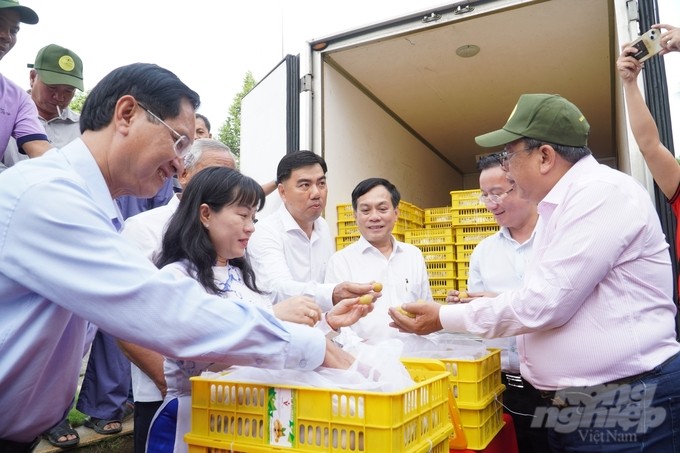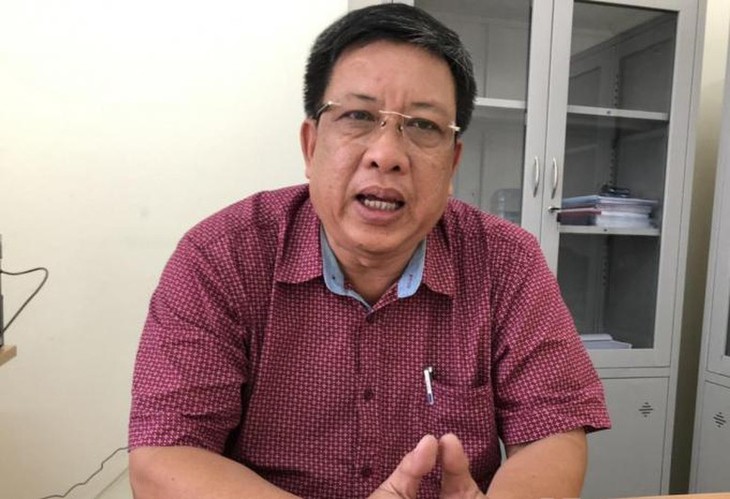(VOVWORLD) -The Mekong Delta, Vietnam’s largest fruit exporting region with 370,000 hectares of fruit cultivation, has been building concentrated, specialized raw material areas and expanding orchards to meet the demand of trade partners. Fruits of high profitability have been branded.
 The recently exported 1.2-ton shipment of longan was produced by Trang Ti Garden Fruit Production Cooperative in Thoi Hung commune, Co Do district, Can Tho city. (Photo: Kim Anh) The recently exported 1.2-ton shipment of longan was produced by Trang Ti Garden Fruit Production Cooperative in Thoi Hung commune, Co Do district, Can Tho city. (Photo: Kim Anh) |
The 11-member Trang Ti Garden Fruit Production Cooperative has 70 hectares of longan trees in Thoi Hung commune, Co Do district, Can Tho city, and is building raw material areas to meet the standards of the US and Australian markets. According to cooperative member Tran Phuoc Son, cultivation standards are strictly followed.
“We pay close attention to quality. Once our products are qualified, we’ll no longer have to worry about the market. We’ve set up models that follow the VietGap standards. There is no way to compete other than to abide by the standards set by demanding markets,” Son told VOV.
Tran Thai Nghiem, Deputy Director of Can Tho city’s Department of Agriculture and Rural Development, said the locality is focusing investment resources on concentrated, specialized cultivation areas, sustainable farming processes, and links with businesses to ensure stable outlets for agricultural products.
He said in recent years, linking with fruit distributors in Can Tho city has received a lot of interest. “Fruit trees of high profitability, like durian, star apple, and longan, have attracted a lot of attention from businesses. When growing area codes are established, businesses want to link to each other to share material areas to serve export markets,” according to Nghiem.
Fruits from the Mekong Delta region contribute significantly to Vietnam's export total. Of the 370,000 hectares of fruit trees in the Mekong Delta, Tien Giang province has the biggest share – 80,000 hectares – while Can Tho, An Giang, Hau Giang, Vinh Long, and Dong Thap each has 25,000-50,000 hectares.
 Le Thanh Tung, Deputy Director of the Crop Production Department (Photo: nongnghiep.vn) Le Thanh Tung, Deputy Director of the Crop Production Department (Photo: nongnghiep.vn) |
Le Thanh Tung, Deputy Director of the Crop Production Department at the Ministry of Agriculture and Rural Development, said concentrated, specialized cultivation areas are connecting people and businesses in domestic sales and export. Individuals, cooperatives, and businesses have been encouraged to link up to stabilize farm produce output and meet the standards set by import countries.
Tung said local farmers have succeeded in getting trees to bear fruit out of season, reducing seasonal pressures and ensuring export contracts. “We used to do exports by season. Now, thanks to getting trees to bear fruit out of season, we have fruit throughout the year,” said Tung, adding, “The Mekong Delta leads Southeast Asia in doing this. In the Mekong Delta, 30 to 45% of fruit trees can be made to bear fruit at a fixed time. Thailand is learning to do this from Vietnam. We’re trying to figure out how to adjust the fruit bearing time for all types of fruits.”
Vietnam’s fruits are exported to 60 markets worldwide. Some growers have established their brand in China, the US, Australia, the EU, Japan, and South Korea. The Mekong Delta leads Vietnam in fruit exports, earning 4.6 billion USD in the past eight months, up 30% from last year.
At a recent press conference in Beijing, spokesperson for the Chinese Ministry of Commerce He Yadong said China is the largest importer of Vietnamese agricultural products. “Vietnamese fruits, such as durian and dragon fruit, are popular with Chinese consumers. Farm produce imported from Vietnam accounts for about one-fifth of the total import value of agricultural products,” said He.
Many fruit shipments having been exported to demanding markets has proved that the Mekong Delta’s fruit industry has changed to meet the standards of import partners. Mekong Delta localities are building concentrated, specialized growing areas that adhere to VietGap standards and seeking investors to create added-value processed products.